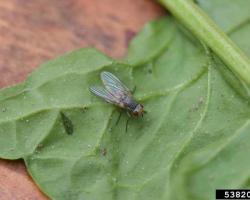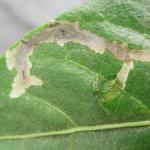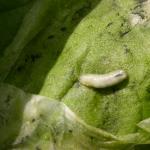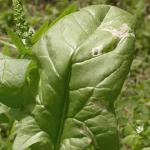Leafminer, Beet and Spinach
Spinach and beet leafminers are two closely-related species of early-season maggot pests that damage early greens. These insects attack crops and weeds in the plant family Chenopodiaceae, which includes chard, beets, and spinach, as well as several weed species including lambsquarters. Spinach leafminer (Pegomya hyoscyami) and beet leafminer (Pegomya betae) are very similar species in behavior, appearance, plant hosts, and damage and generally cannot be distinguished in the field. However, beet leafminers prefer laying eggs on beet leaves and spinach leafminer may also cause damage in solanaceous crops such as peppers.
Life Cycle:
The fly overwinters as a pupa in the soil and emerges around mid-May. The adult—a small, gray fly 5-7 mm long—then lays eggs on the undersides of host leaves. The small (<1 mm), oblong, white eggs are laid in neat rows on the underside of the leaves and hatch in 3-6 days. They are easy to spot if you scout by looking under the leaves. The resulting larvae can be seen by peeling the outer layer of the leaf to reveal one or several pale, white maggots. They become fully grown in just a few weeks and drop into the soil to pupate, though they may also pupate inside the leaf.
The entire life cycle is 30-40 days and there are 3-4 generations per season. These generations overlap and can cause continuous season-long damage to succession-planted spinach, beets, and chard. Typically mid-late May, late-June and mid-August are peak activity periods. After August, pupae enter the overwintering phase and won’t emerge until next spring.
Spinach leafminer eggs. Spinach leafminer larva. Adult spinach leafminer. Photo: Whitney Cranshaw. 


Crop Injury:
Small tunnels created by leafminer activity. 
In most seasons, the damage is minimal and the plants will outgrow it, leaving only early leaves with cosmetic damage. In other years, or other fields in the same year, the damage may be severe, and if the plants are hit early and growth is slow because of weather conditions, the loss may be great. This may be especially true when eggs on transplants in the greenhouse go unnoticed until planting in the field, resulting in infestations in row-covered crops. Treat when eggs or first tiny mines are noticed.
Monitoring & Thresholds:
Begin scouting susceptible crops in mid-May. Scout undersides of leaves for eggs and treat when they are first observed in order to target larvae as they hatch. Scout again 7-10 days after treatment to determine if follow-up treatment is needed.
Cultural Controls & Prevention:
Weed control and crop rotation are the first line of defense, since these leafminers feed mostly on one crop group that also includes many common weed species e.g. chickweed, lambquarters, and nightshades. Rotate beet, chard, and spinach to new fields in the spring and during the growing season. Avoid placing spring plantings near tunnels where winter greens were grown. Row covers or insect netting can be used to exclude flies if placed over the crop immediately after planting or before flies are active, but be sure not to cover crops in fields where susceptible crops were grown previously and where adult flies may be emerging, as they will get trapped under the cover.
Chemical Controls & Pesticides:
There are effective treatments available for both conventional and organic growers. Use an adjuvant to improve efficacy unless the product label advises not to. Ensure good coverage of the lower leaf surface. For current recommendations and information on production methods (including varieties, spacing, seeding, and fertility), weed, disease, and insect management, please visit the New England Vegetable Management Guide website(link is external).
Crops that are affected by this insect:
--UMass Vegetable Program. Adapted from an article by Eric Sideman, Maine Organic Farmers and Gardeners Association
The Center for Agriculture, Food and the Environment and UMass Extension are equal opportunity providers and employers, United States Department of Agriculture cooperating. Contact your local Extension office for information on disability accommodations. Contact the State Center Director’s Office if you have concerns related to discrimination, 413-545-4800 or see ag.umass.edu/civil-rights-information.

